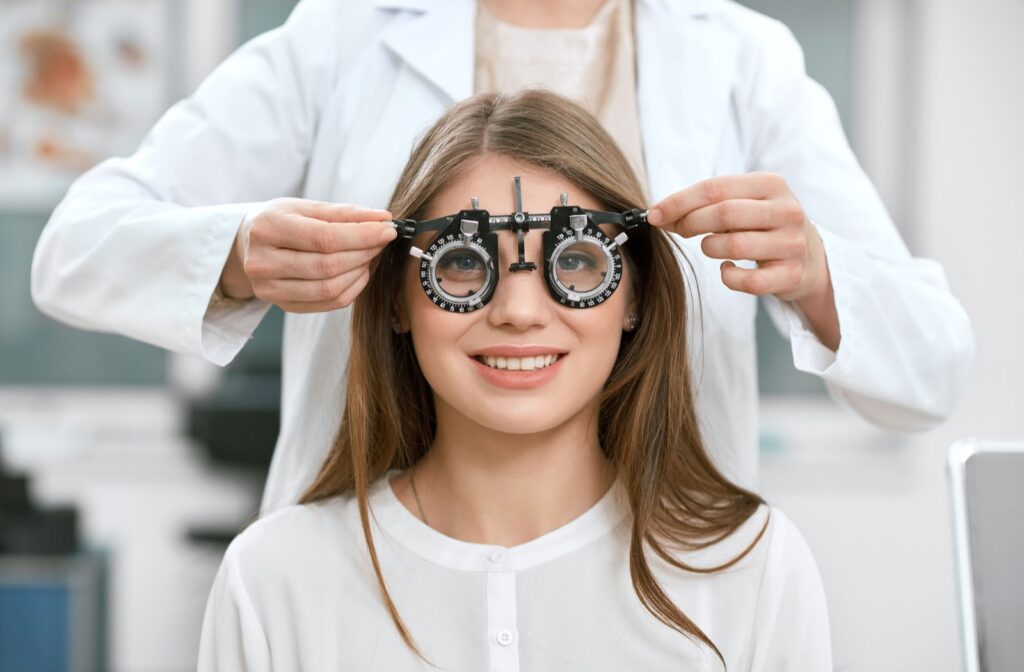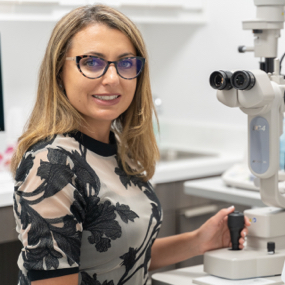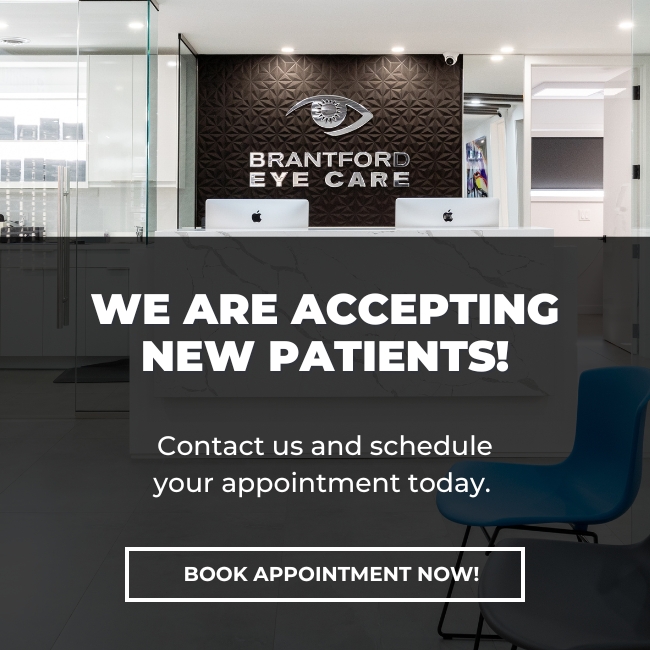Vision is the sense that we use most during our day to day interactions with the world around us. Typically when we think of someone with “perfect” vision, we refer to them as having 20/20 sight, but there are actually many more visual skills that are essential to allow us to navigate our world. Clear vision is only part of the picture! While many of these skills develop naturally in children, in some cases a child may have a delay in one or more areas that can impact their ability to see effectively . Your optometrist can identify any issues your child may be having during a comprehensive eye exam.
When visual skills don’t develop well, they can affect your child’s learning and self-esteem. The goal of vision therapy is to help retrain these visual skills, or in some cases to help a patient relearn skills after they have been negatively impacted by a brain injury or stroke.
Continue reading to learn more about vision therapy, including what it is, how it works, and who can benefit. While vision therapy can benefit both children and adults, today’s blog will focus on vision therapy for children.
What is Vision Therapy?
Vision therapy is a specialized form of treatment for improving visual skills and abilities. A patient in vision therapy is given a number of challenges, and with the help of a trained therapist, learns how to address the challenges in a way that is more efficient than what they may have previously learned how to do.
Vision therapy includes a mixture of in-office and at-home exercises to help your child’s vision. Your child may benefit from vision therapy if they:
- Read below their grade level
- Lose their place or miss words when reading
- Confuse similar letters
- Reverse letters like b, d, p, & q
- Writes numbers backward
- Judge depth poorly
Your eyes and brain must work together to perform everyday tasks. Good vision is necessary for your child’s development as they grow into adulthood.
Your Child’s Vision is Important
Vision is crucial for your child’s development. Nearly 80% of learning is visual, and your child needs to read, write, play, and interact with others as they grow. A vision problem can affect their school performance, social interactions, and self-esteem.
Your child’s visual skills will help them succeed in many aspects of life. These essential skills include:
- Eye movement control
- Depth awareness
- Simultaneous focus from all distances
- Peripheral vision
- Central vision
Your optometrist can assess what issues your child is facing if they struggle in school or other areas of life. After diagnosing a problem, your eye doctor may recommend vision therapy. What conditions can this treatment address?
What Can Vision Therapy Treat?
Vision therapy can address several eye issues. Your eye doctor can help determine if this treatment is beneficial for your child’s needs. Some common problems vision therapy can address include:
- Convergence insufficiency
- Amblyopia
- Strabismus
- Double vision
- Eye teaming & tracking problems
- Focusing difficulties
- Eye fatigue
- Depth perception
- Eye-hand coordination issues
Amblyopia
Another name for amblyopia is a lazy eye. This condition occurs because of abnormal vision development in early childhood. One eye is weaker than the other, often wandering.
This condition typically develops between birth and age 7, but your child may not notice any problems at first. The developed eye tends to become dominant when completing visual tasks. Your optometrist can diagnose this condition during a comprehensive eye exam.
After diagnosing amblyopia, your optometrist can recommend vision therapy or another treatment they think can best address your child’s condition.
Strabismus
Strabismus is a condition where your child’s eyes aren’t properly aligned. Also known as crossed eyes, this condition can lead to double vision or amblyopia, as the child’s brain typically learns to ignore the turned eye.
This condition is common in children under 6. You’ll typically notice strabismus because one or both of your child’s eyes will wander. After diagnosing this condition, your optometrist can recommend vision therapy, eyeglasses or sometimes surgery as a suitable treatment.

How Does Vision Therapy Work?
Vision therapy helps train your child’s eyes to work together effectively. Their eye muscles are already strong, but they may lack coordination. Vision therapy aims to help retrain aspects of your child’s vision that don’t work as effectively.
There are several goals for vision therapy, depending on your needs. Your optometrist wants to help your child:
- Develop or improve fundamental visual skills & abilities
- Improve visual comfort, ease, & efficiency
- Change how they process or interpret visual information
Your child accomplishes these goals through the use of different exercises to train their weak visual skills. These exercises are either in-office under supervision or at home for additional strengthening of skills.
Besides these exercises, your optometrist will use many supporting tools during your child’s treatment, including:
- Therapeutic lenses
- Filters
- Prisms
- Occluders or patches
- Electronic targets with timing mechanisms
- Balance boards
- Specialized tools designed for unique vision therapy activities
How Long Until You See Results?
The length of treatment depends on the severity of your child’s vision problems. Some people may need a few weeks, and others may require months to see noticeable changes. Your optometrist can answer any questions you have about vision therapy and how long it takes to see results.
Is Vision Therapy Only for Children?
While visual issues can be common in children, anyone can benefit from vision therapy. Visual skills can improve at any age. Vision therapy can help you work and focus more effectively.
Vision Therapy Can Help
Whether you or your child or having visual issues, your optometrist can help. Vision therapy can improve how your eyes work together. If you’re interested in vision therapy, contact your optometrist and see if you can benefit from this form of treatment.




